Businesses across the globe are recognised for showing innovation and leadership
Ethical Corporation’s sixth Annual Responsible Business Awards ceremony, held in London in September, brought together more than 200 leading figures in global responsible business.
Judges were looking for organisations that have led the agenda in corporate responsibility during 2015. To reflect current industry trends, the categories were revamped this year and grouped into four main themes: business strategy, communications excellence, value chain sustainability and internal engagement.
Value chain sustainability
With the growing number of refugees putting increased pressure on the supplies and resources of non-profit organisations and agencies, including the UN High Commissioner for Refugees (UNHCR), the Best Business/NGO Partnership category saw the judges highly commend the work of the UPS Foundation and UNHCR, who have worked together to optimise distribution and track critical supplies in the world’s most crisis-affected areas.
Since 2010, UPS has provided $2m in funding and in-kind support to UNHCR and has leveraged its core business capabilities – its global logistics network and technical expertise – to generate life-saving innovations that support UNHCR’s work.
Closer to home, KPMG and Citizens UK have been working together since 2005 to tackle the issue of in-work poverty, through the creation of the Living Wage Foundation and the rollout of the Living Wage. Since inception, more than 60,000 families have been raised out of poverty, and judges selected this partnership as winner of the category. “It is wonderful to see our partnership working recognised by our peers,” said KPMG’s Laura Brookes.
Effective partnerships between companies were also scrutinised by the judges. Winners of the Best B2B Partnership award were aluminium supplier and recycler Novelis and the UK’s largest automotive manufacturer, Jaguar Land Rover (JLR).
Using aluminium in cars creates a lightweight yet strong solution that enables vehicle mass and fuel consumption reductions and lower levels of carbon-rated taxation. While aluminium is infinitely recyclable, closed-loop recycling has been limited. So in 2008, Novelis and JLR launched Realcar (Recycled Aluminium Car) to create a close-loop production model with the capacity to recycle automobiles at the end of their lives. JLR also invested £6.2m to ensure that press shop metal scrap could be segregated into the separate metals. As a result, a closed-loop value chain was created.
Social mobility is a big problem in the UK, with a high level of unemployment among young people. The GoThinkBig initiative from Telefónica UK (which trades as O2) and Bauer Media was highly commended by judges for its vision to offer inspiring content to help young job seekers, alongside real experience and career opportunities.

GoThinkBig is an accessible platform that young job seekers can use to apply for work and skills experience without having to know someone who works within the company. Attracting around 60,000 unique users to the site each month, the initiative is on track to meet its commitment to offer more than 30,000 opportunities in the first three years.
In the field of supplier engagement, the judges chose to highly commend two separate organisations. The East of England Co-op’s Sourced Locally initiative provides a route to market for the region’s growers and producers. Its innovative supply chain model enables producers to deliver directly to stores within a 30-mile radius of their operation, increasing the number of producers that are able to be involved and dramatically reducing food miles and waste.
Together for Sustainability (TfS) is a joint initiative to create benchmarks for sustainable supply chains. Founded in 2011 by the chief procurement officers of six multinational chemical companies, this global supplier engagement programme was described by the judges as “an excellent, industry-leading initiative that has a tangible impact on supply chains that can be replicated in other industries”.
Winner of the Best Supplier Engagement category was healthcare company GSK, for its Supplier Sustainability Programme. A key part of the programme is the Supplier Exchange. Matt Wilson, GSK’s head of environmental sustainability, explains: “We set up the Supplier Exchange platform to help us engage with our suppliers: to let them know about our supply chain sustainability strategy and initiatives and to encourage their collaboration with both us and each other to find solutions to reduce the carbon footprint that sits in the raw materials part of our value chain.”
The Most Effective Community Investment award is not based on the monetary level of investment, but rather the impact made on local communities from a strategy that results in a win-win outcome. Again, the judges chose to highly commend two organisations. SM Prime Holdings’ SM Cares housing project, which is building 1,000 disaster-resilient homes for the survivors of Typhoon Haiyan, is privately funded by donations from SM’s tenants, business partners and the community.
Australian telecoms firm Optus has teamed up with children’s charity The Smith Family with its student2student mobile programme, which works by matching disadvantaged student readers with “buddies” who provide over-the-phone reading support two to three times a week. In today’s digital age, judges commended Optus for “clear and tangible results benefiting youth education in Australian society based on basic telephony”.
Overall winner in this category was PepsiCo’s Food for Good (FFG) programme (see box), which tackles the issue of child hunger in the US.
Most Effective Community Investment: PepsiCo’s Food for Good programme
In the US, child hunger is a persistent problem. Created in 2009, PepsiCo’s Food for Good (FFG) programme develops creative solutions to make healthy food accessible to low-income families.
The drinks giant has formed strategic partnerships with non-profit organisations and local governments, and dedicated a full-time team to build meal programmes and pop-up farm stands. Meal programmes provide children with healthy food, including fruit, vegetables, grains and dairy, through partnerships in the US Department of Agriculture’s Summer Food Service Program and Child and Adult Care Food Program. Its farm stands create pop-up healthy food stores, where fresh produce is delivered and sold in $1 bundles. The farm stands also help break the cycle of poverty by employing members of the community.

Together with partners, FFG has delivered 17m healthy servings to low-income children while creating hundreds of jobs.
FFG also benefits PepsiCo’s business and serves as an innovation incubator within its R&D team. For example, to ensure food-safe temperatures in extreme heat, PepsiCo developed proprietary “cold boxes” – phase-change material combined with effective insulation and stackable boxes to facilitate simple and safe warehouse and delivery processes.
The final award in this category was for Most Effective International Community Investment. Judges were looking for a genuine commitment to vulnerable communities over a two-to-five-year timescale. Old Mutual was highly commended for its On The Money programme, which provides free, simple financial education for the mass market across Africa. On The Money has directly impacted almost 400,000 individuals since implementation, with a further reach of 15 million people through radio and digital programmes.
Two winners were selected. Communications and entertainment company Digicel won for its Improving Education in Haiti – which built 150 schools. Following the devastating earthquake of 2010, 90% of the buildings in Port-au-Prince were destroyed and Haiti’s education system came to a near collapse. Through the Digicel Foundation, Digicel kick-started reconstruction efforts by increasing the number of schools it committed to build in local communities from 20 to 50. In September 2014, Digicel opened its 150th school, which marked a total investment of more than $39m in the school building project and the creation of more than 10,500 construction jobs.
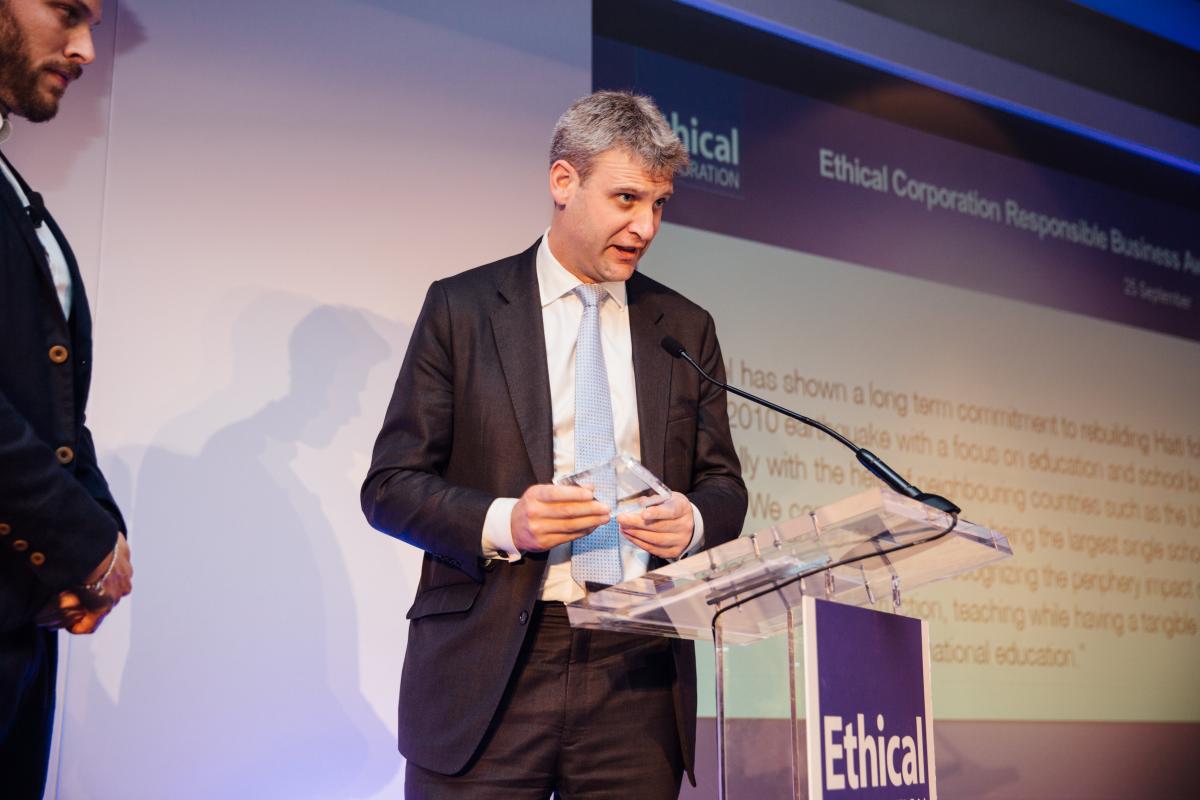
Digicel chief executive Colm Delves said: “Supporting our communities and the needy across the world is a core part of Digicel’s ethos of giving back and helping the less fortunate. We are happy that these students now have comfortable surroundings in which to learn and grow.”
UPS drew from its extensive experience in disaster relief to establish a robust Ebola response through its Humanitarian Relief & Resilience Program, which in 2014 provided $8m in funding, in-kind and technical support for disaster preparedness, response and recovery initiatives. UPS volunteers helped sort and package medical supplies for the region and the UPS-funded staging area provided funding, warehousing, loading and build-up capabilities to the World Food Programme (WFP), enabling critical supply shipments to reach more than 40 non-profit groups combating the spread of Ebola in the region.
Rick Leach, chief executive of WFP, described UPS’s experience and expertise as “invaluable” in a global crisis. The judges agreed.
Communications excellence
As well as building trust, companies need to make their corporate story meaningful and relatable to their stakeholders, so the judges were looking for those that had used innovative methods to engage stakeholders in their sustainability work.
Winner of the Best Corporate Communication award was Carbon Tracker Initiative Ltd (CTIL) a financial thinktank that produces analysis, research and materials that communicate new sustainable paths to a diversified audience of fossil fuel companies, investors and the media. Judges described CTIL as “an agenda-setting business model influencing attitudes in a highly sceptical audience”.
When it comes to sustainability, getting consumers on board, whether through traditional or new media channels, is no mean feat. The Best Consumer Engagement Campaign award went to Telefónica UK (which trades as O2), creators of Europe’s biggest mobile network recycling programme. The company’s various campaigns empower customers to make informed choices throughout the product lifecycle. These range from a pre-purchase Eco-Rating system, to discouraging the purchase of unnecessary chargers, to a new tariff that encourages customers to keep their devices for longer.
In a similar vein, Globe Telecom’s e-waste recycling programme, Project 1 Phone, was also highly commended. Encouraging people to donate their old phones and e-waste so that the financial proceeds can be converted into new schools for the benefit of Typhoon Haiyan victims, Project 1Phone generated significant social media buzz. Its video garnered nearly 500,000 views on YouTube and the initiative generated 37.2 million impressions for all its digital efforts. Yoly Crisanto, Globe Telecom's senior vice-president for corporate communications, said: “Educating people on how to dispose of e-waste properly and be able to do more inspires us to think of other programmes for greater social good. We are grateful for this commendation as it helps us drive our sustainability programmes further.”

Communicating that a company has delivered its corporate responsibility undertakings needs to be done in a transparent, honest and consistent way. The award for Best Business to Consumer Sustainability Report went to marketing communications group WPP. Vanessa Edwards, head of sustainability at WPP, said: “Since we began reporting in 2002 we have worked to improve our report each year, aiming to create a balanced account of our progress which is accessible and engaging for a wide audience.”
Winner of the award for Best Business to Business Sustainability Report went to Turkish firm Brisa Bridgestone Sabanci Tyre Manufacturing and Trading, who “demonstrated excellence in sustainability transparency and reporting as a way of building growth and trust in their business”.
The Crown Estate was highly commended in the Best Integrated Report category for its three-year strategic overview to integrated reporting, which the judges felt served as “a fantastic model for all those aspiring to adopt this framework”. All entries to this category were very strong, resulting in two winners: paint and chemicals multinational AkzoNobel and the Swedish Government’s Swedfund. Both were praised for their clear, comprehensive and strategic approach to integrated reporting. Commenting on his company’s achievement, André Veneman, AkzoNobel’s corporate director of sustainability and HSE, said: “It’s always pleasing to receive recognition, but more than anything, this award strengthens our belief that sustainability should sit at the heart of our business strategy.”
Business strategy
Incorporating sustainability into commercial objectives, or applying it to address a business challenge, were key factors in the Sustainable Innovation category.
Ecologically sound disposal of rubber presents real challenges. Clothing and footwear brand Timberland teamed up with tyre manufacturer Omni United to look at extending the life of rubber tyres. The result was Timberland Tires, the first tyres purposely designed to be recycled when their road life has expired, when they are made into the outer soles of Timberland shoes. The judges highly commended the initiative.
Tetra Pak Group took first prize for the world’s first fully renewable liquid food carton package. The Tetra Rex bio-based package is unique within the industry, as it is manufactured solely from a combination of plastics derived from sugar cane and FSC-certified paperboard. Judges were impressed that Tetra Pak had designed a “potentially transformative packaging solution”.
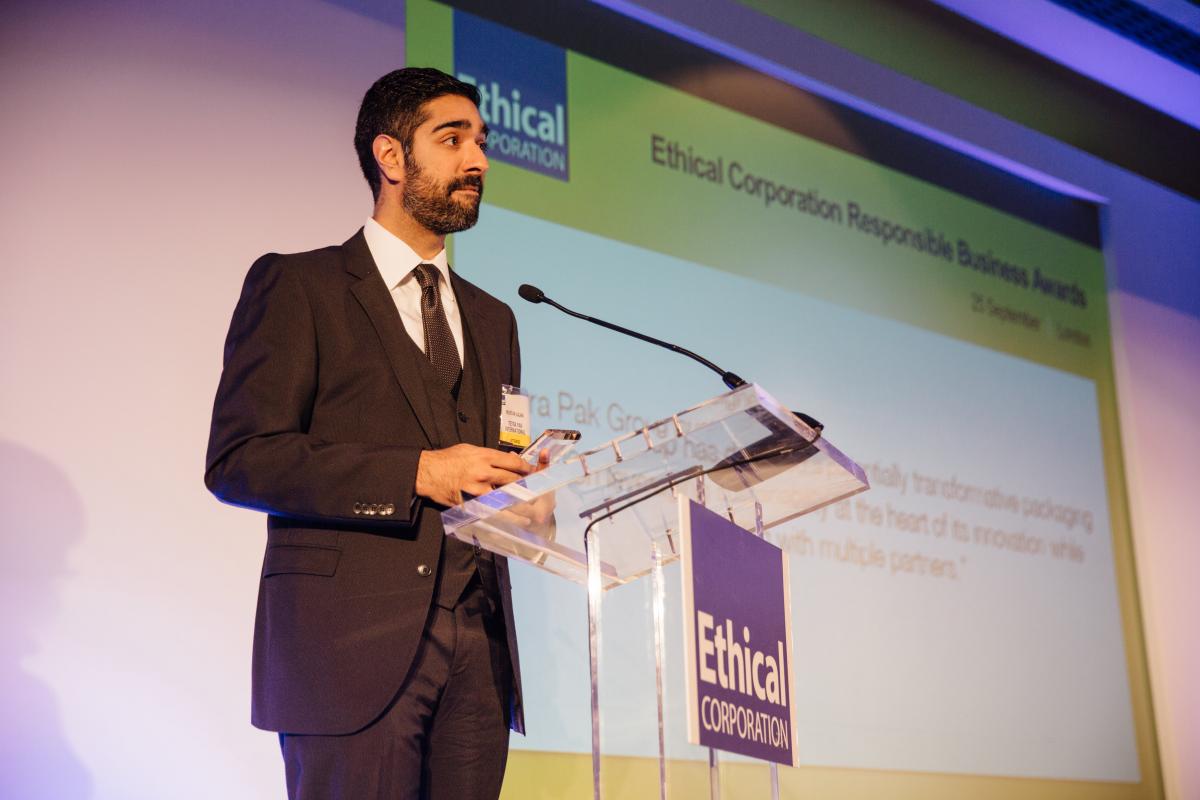
Charles Brand, Tetra Pak’s executive vice-president for product management and commercial operations, said: “Both sustainability and innovation are at the heart of our business agenda. To finally see fully renewable packages on shop shelves globally is a fantastic feeling, and bears testimony to the focused efforts of the many customers, suppliers and Tetra Pak employees involved in making this a reality.”
For developing an innovative technology that gives voice to the global workforce, the non-profit Good World Solutions received the Best Social Enterprise award. Labor Link is a monitoring system that creates an anonymous two-way communication channel for workers to report on factory conditions, and for companies to receive real-time data directly from workers, 365 days a year. Since 2010, Labor Link has reached more than 250,000 workers in the supply chains of major clothing and electronic companies including Cisco, Vodafone and Marks & Spencer. It currently operates in 16 countries, including China, India and Bangladesh. “Labor Link was born from a simple truth – mobile phones are ubiquitous at the base-of-the-pyramid, making direct communication with factory workers around the world both possible and cost-effective,” explains Tom Rausch, co-founder and director, strategy and innovation. “We are well on-track to reach 1 million workers by 2017.”
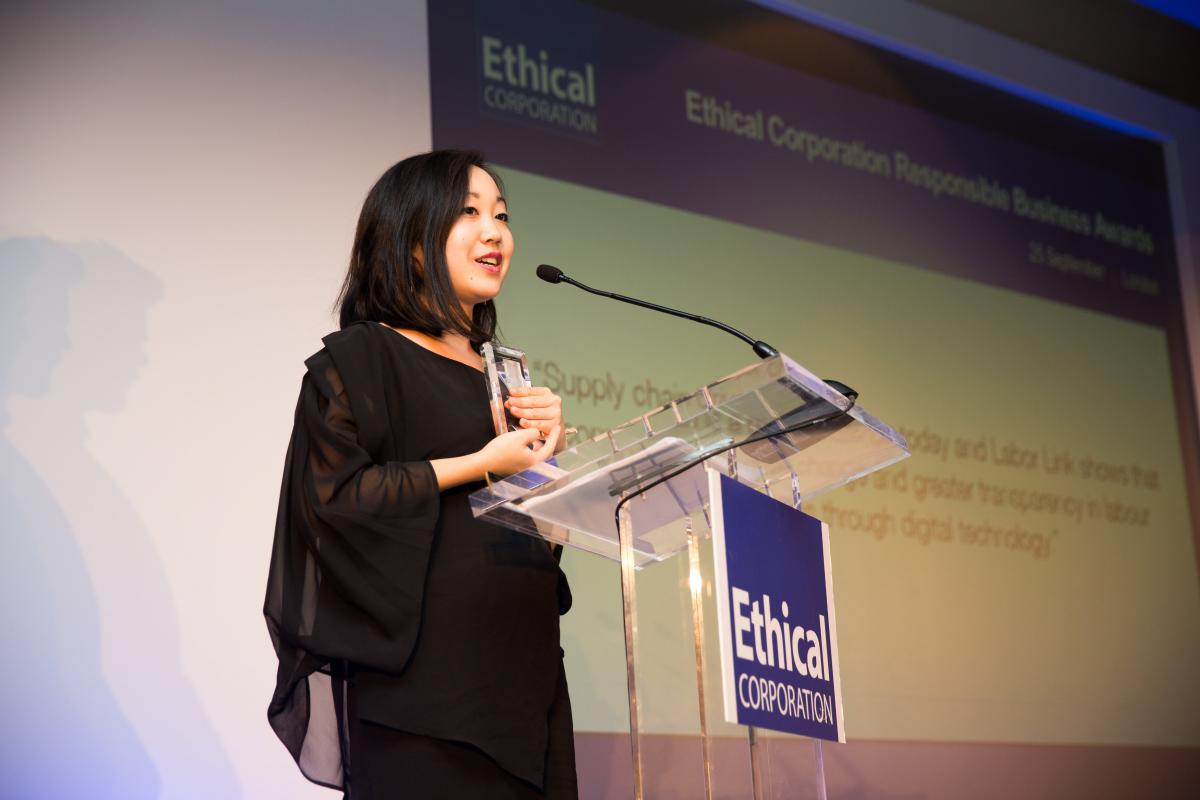
Restricted to companies and organisations with fewer than 250 employees, the Best Small to Medium Size Enterprise category allowed for a wide variety of entrants. Danish building merchant Troldtekt was highly commended for its acoustic panels, which are made from natural raw materials. Peer Leth, Troldtekt chief executive, said: “We are investing massively in sustainable, responsible initiatives, among other things, within renewable energy and material recycling. Being Highly Commended at the Responsible Business Awards confirms that we are on the right track.”
South-east Asian clean energy company Sindicatum Sustainable Resources took the award for its waste-to-energy initiatives, which create value from waste on a large scale in developing markets. The judges recognised that this enterprise is in a region with challenging business models and wanted to give the initiative greater visibility.
Woolworths Holdings, a retail chain that extends throughout Africa and Australia, was voted Best Public Company. It has a number of programmes to ensure sustainability in its supply chain and, through the Woolworths Trust, has raised millions of dollars to support educational programmes throughout the southern hemisphere. Clear targets at store and individual level, with innovative partnerships and solid regional leadership, were the qualities that helped it win the category. Upon receipt of the award, Woolworths said: “Being acknowledged for our innovative partnerships and regional leadership on these sustainability issues serves as recognition for a job well done.”

Industrial aluminium company Novelis took home the Best Private Company award, having fundamentally changed its business model to revolve around sustainability and committed $500m to increase its global recycling capacity. By adopting new ways of thinking and being willing to embrace disruption in the company, the new model has seen operations shift from a linear to an increasingly closed-loop business model.
Earth Friendly Products, the first American company to pay the minimum wage of $17 per hour, was commended for its dedication to selling carbon-neutral products “while using employees as ambassadors of sustainable change”.
Internal engagement
Any business that is looking to embed sustainable practices into its operation has little choice but to engage its employees. AkzoNobel’s two-year internal engagement plan earned the company a commendation from the judges. By building a participative sustainability culture, which recognised and rewarded employees that contributed to achieving the company’s goals, employee perception of the importance of sustainability shifted significantly.
Timberland has a long heritage in employee engagement, having launched its Path of Service programme back in 1992, which provided full-time employees with up to 40 paid volunteer hours per year. In 2014, 78% of employees volunteered, serving more than 72,000 hours in more than 100 locations in 19 countries. This contributed to a major milestone – reaching one million hours served – and saw the firm take the Best Employee Engagement award.
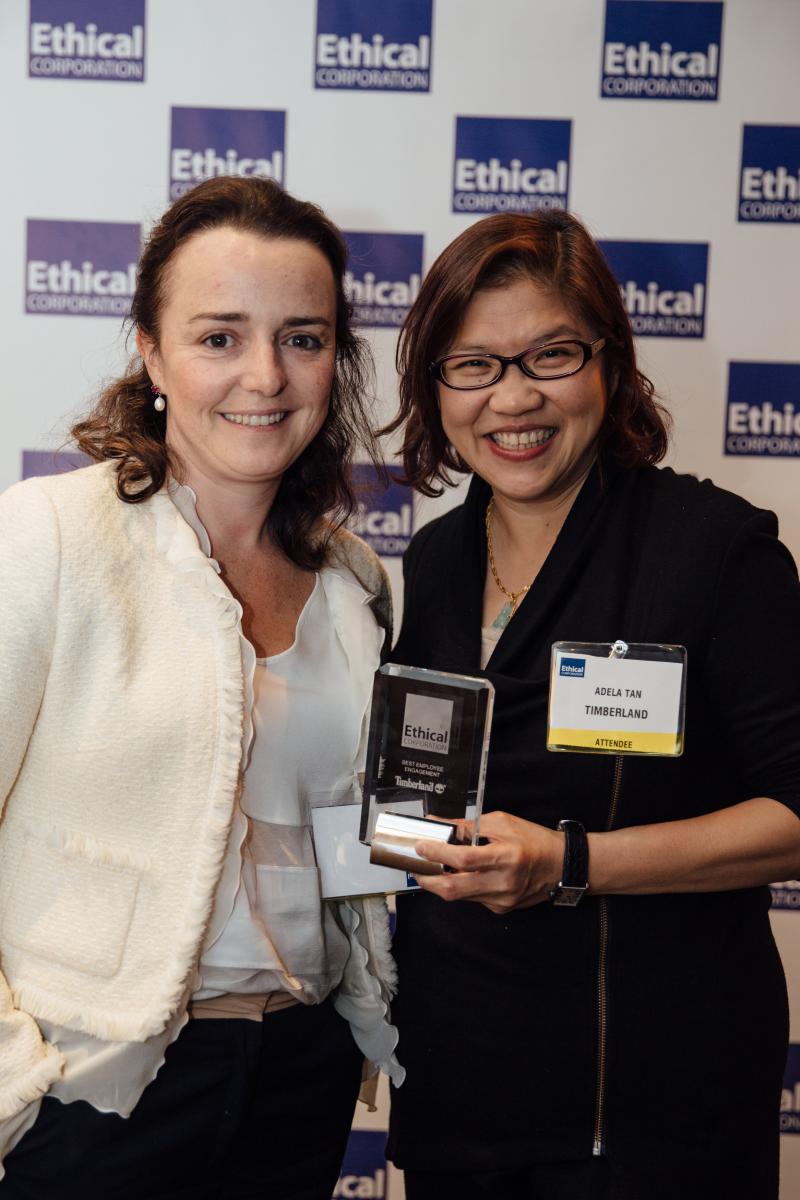
This year’s Head of Sustainability of the Year award went to Bérangère Magarinos-Ruchat, vice-president sustainability partnerships at Swiss perfume and flavour company Firmenich.
A recognised sustainability leader for more than two decades, Magarinos-Ruchat started her career at the United Nations before moving to the Global Alliance for Improved Nutrition (GAIN), where she created the GAIN Business Alliance. In 2010, she joined Firmenich, where she has launched numerous successful initiatives. On receiving the award, Magarinos-Ruchat said: “I truly believe in inclusive growth; in embedding sustainability into a company’s core business. Throughout my career, I have worked with public and private organisations who understand that sustainability is not a trend, but a way to do business with a long-term focus.”
This year’s CEO of the Year was Ronan Dunne, CEO of Telefónica UK (O2), whom judges praised for putting O2 at the forefront of sustainable businesses on a diversity of topics, including youth employment schemes, large industry recycling and environmental stewardship (see box).
Last but not least, the 2015 Lifetime Achievement award went to John Elkington, founder of boutique consultancy firm Volans, co-founder of SustainAbility and Environmental Data Services, and originator of the term “triple bottom line”. Described by Business Week as “a dean of the corporate responsibility movement for three decades”, Elkington is a true proponent of and credit to the sustainability cause. The judges thanked Elkington for his “tremendous contribution to pioneering the concept of corporate sustainability and pushing it up the agenda of the world’s largest companies”.
CEO of the Year – Ronan Dunne, CEO of Telefónica UK (O2)
Ronan Dunne became CEO of Telefónica UK (known to its customers as O2) at the end of 2007. He embedded sustainability into O2 by engaging its 10,000 employees, driving a sustainability vision and strategy, and launching the Think Big Blueprint – a three-year sustainability plan outlining three ambitious goals underpinned by 40 commitments.
“Our award-winning sustainability programmes have galvanised our business to make a positive impact on people and planet,” says Dunne. “I am incredibly proud of our role in supporting a generation of young people across the UK to gain digital, enterprise and employability skills through Think Big.” To date, O2 has invested in more than 7,000 social action projects, designed and led by young people. “Our programmes have helped young people to embrace the opportunities of the emerging digital economy, and together with our partners, we’ve offered over 30,000 work experience opportunities to young people,” he explains.
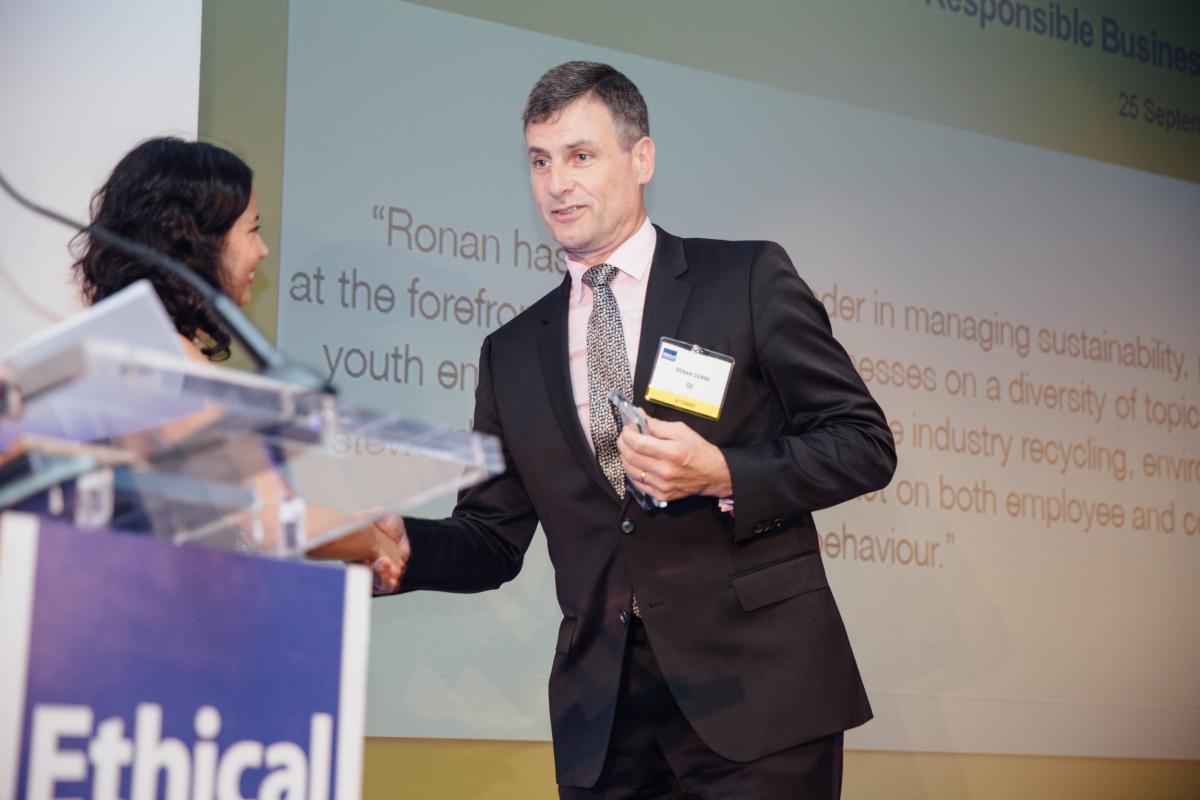
Dunne also plays a key ambassadorial role, promoting O2’s commitments and performance to the media, stakeholders and customers. He personally chairs the Sustainability Taskforce, meeting every six weeks to oversee business performance, keeping sustainability at the top of everyone’s agenda and holding senior management to account. “This group sets the strategic business direction on sustainability,” he says. “Our leadership commitment, coupled with our Think Big Blueprint plan and the support of a network of ‘Big Thinkers’ across our business has enabled us to embed the sustainability agenda across our company.”
Dunne genuinely cares about O2’s contribution to people and planet, inspiring employees and leading cross-sector collaboration to solve social problems.
“If you were asking me for advice, I’d say never underestimate the power of collaboration,” says Dunne. “For me that is the key to success in sustainability, past, present and future. Some of the greatest things we’ve done have been built not by O2 alone, but by partnering with others.”
Awards conference review KPMG Jaguar Land Rover Telefonica PepsiCo

